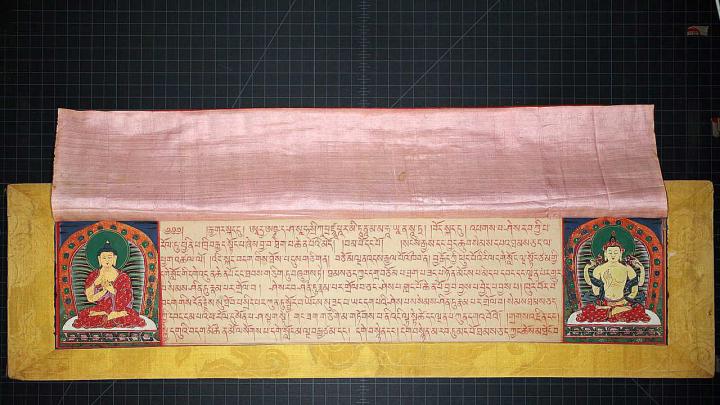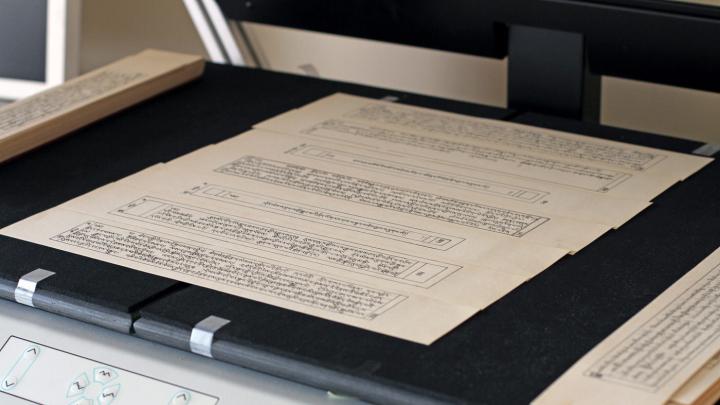Beginning in July, Harvard Library will upload onto its digital storage system 10 million pages of Tibetan literature that survived China’s convulsive Cultural Revolution, the movement between 1966 and 1976 that led to the destruction of countless Chinese and Tibetan literary texts. The project is the result of a partnership between Harvard Library and the Tibetan Buddhist Resource Center (TBRC), a nonprofit organization based in Harvard Square that has been acquiring, scanning, and digitally preserving Tibetan volumes since its founding in 1999.
Leonard van der Kuijp, professor of Tibetan and Himalayan studies at Harvard and president of the center’s board of directors, explained that an enormous number of Tibetan texts disappeared during the Cultural Revolution, which affected the Tibetan plateau as much as it did the rest of China. “But many books were somehow saved by local Tibetans, monks and laypeople who buried the books, put them in boxes, wrapped them in cloth, and buried them in the ground,” he added. “And now, slowly, these books are coming out.”
TBRC has played a central role in assuring the preservation of the surviving works. The center developed from the vision of Gene Smith, a librarian and Tibetologist who started his private collection of Tibetan books while serving at the New Delhi field office of the Library of Congress between 1968 and 1985. According to TBRC executive director Jeffrey Wallman, Smith estimated that 800,000 volumes had been produced on the Tibetan plateau before the onset of the Cultural Revolution—but that only 100,000 survived. With van der Kuijp’s help, Smith established TBRC at the turn of the millennium in order to catalog, preserve, and make available the Tibetan literary heritage. Initially headquartered in Harvard Square, TBRC was relocated to New York City in 2002, where it remained for 10 years before moving back to Cambridge.
The center began to scan and catalog Smith’s 12,000-volume collection immediately upon its founding, van der Kuijp recalled. “Then we moved the scanning process beyond the confines of his own library and scanned every single Tibetan text we could lay our hands on.” Smith, who died in 2010, requested in his will that his collection be returned to the Tibetan people. A library bearing his name opened last fall at the Southwest University of Nationalities in Chengdu, China, an area with a significant Tibetan population. Wallman, who began working at the center in 2002, praised Smith for his brilliant and vast vision, adding that “he had a really fascinating view of the literature as a whole.”
Wallman and Richard Lesage, the Harvard librarian for South and South-East Asia who has helped spearhead the collaboration, said that it would take approximately a year to upload the files onto Harvard Library’s Digital Repository System (DRS), a digital storage service that will serve as a backup for TBRC’s own digital files. As Lesage explained, TBRC was concerned about the long-term preservation of the digitized Tibetan texts, and DRS represents a “safe haven,” added associate librarian for collection development Dan Hazen, who has helped coordinate the project. Harvard Library will also incorporate the TBRC catalog into the HOLLIS catalog, making the Tibetan texts available to the library’s users. (HOLLIS will not provide access to TBRC’s collections directly, Lesage said, but will redirect users to the TBRC database.)
Hazen defined the collaboration with TBRC as one of Harvard Library’s “hallmark projects” since its recent administrative and organizational restructuring. Lesage described the long-term preservation of the Tibetan literature as a service not only to the scholarly community but also to humanity as a whole. As Wallman explained, the center has so far acquired approximately 20,000 volumes dating from the eighth century to the twentieth, covering subjects ranging from Buddhist teachings and theories to philosophy, history, poetry, architecture, and medicine.
Despite all the political tensions that have arisen concerning China’s governance of the Tibetan region and people, TBRC experts explained, the climate in China is now particularly favorable to the preservation of the Tibetan literary heritage. The government has recently passed a law protecting the Tibetan language, said Greg Beier, the center’s director of sustainability. “This is an ideal time for really getting involved with looking for the texts and making them available to the world,” he noted, adding that the Tibetan literary heritage is “a jewel of humanity.” Beier explained that, as a non-political, non-sectarian organization, the center has never run into any problems with the Chinese government.
The preservation of the Tibetan literary heritage is not the only project on which TBRC and the University have collaborated. Peter Suber, director of the Harvard Open Access Project and of the Office for Scholarly Communication, has advised the center on providing open access to its database. Wallman explained that the texts that TBRC has acquired, scanned, and catalogued in the past are currently available for free to individual users, but universities and other institutions must subscribe in order to access the digital collections.
Financial as well as cultural obstacles prevent TBRC from implementing an open access model. Fundraising remains a challenge, even though Beier mentioned that the organization is close to securing a $10-million grant over the next five years; the best potential donors, he said, are those who connect with the importance of TBRC’s work. Open access is also complicated, Wallman explained, because some Tibetans oppose the release of religious materials into the public domain. “Some of the literature is esoteric, for insiders or initiates, and making it available to the uninitiated might violate the tradition,” Suber noted. The problem arises, he suggested, when the uninitiated receive “a fragmentary picture” of Buddhist wisdom. “But if you can convey the complete picture, then this problem disappears.”
Suber declared himself proud of Harvard for helping TBRC preserve Tibet’s literary heritage. “The Tibetan language is endangered, not just for political reasons but because the speaker base is shrinking,” he said. “Even apart from teaching Tibetan Buddhism to people who care to learn it, we have to preserve this culture from danger, from extinction.”











